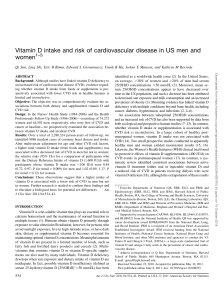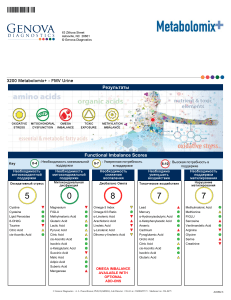NutraHacker Imputed Complete Mutation Report Customer 2d9aeef9-84e2-4839-9748-22c59a02fd94
реклама
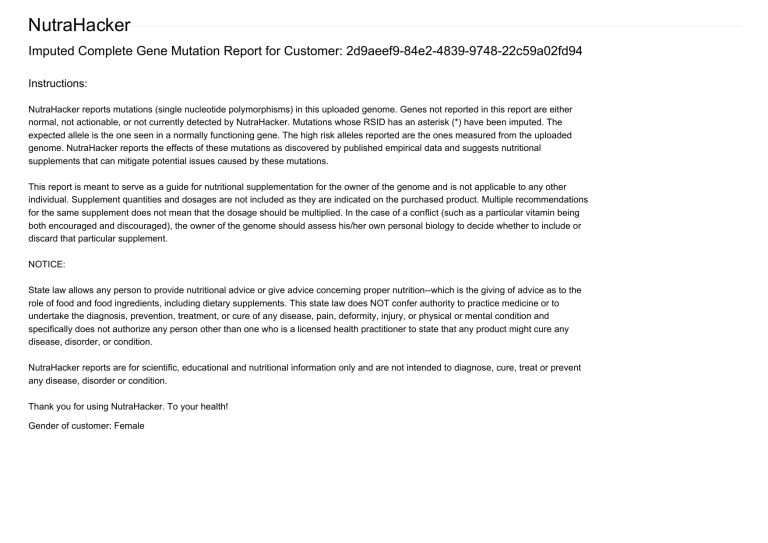
NutraHacker Imputed Complete Gene Mutation Report for Customer: 2d9aeef9-84e2-4839-9748-22c59a02fd94 Instructions: NutraHacker reports mutations (single nucleotide polymorphisms) in this uploaded genome. Genes not reported in this report are either normal, not actionable, or not currently detected by NutraHacker. Mutations whose RSID has an asterisk (*) have been imputed. The expected allele is the one seen in a normally functioning gene. The high risk alleles reported are the ones measured from the uploaded genome. NutraHacker reports the effects of these mutations as discovered by published empirical data and suggests nutritional supplements that can mitigate potential issues caused by these mutations. This report is meant to serve as a guide for nutritional supplementation for the owner of the genome and is not applicable to any other individual. Supplement quantities and dosages are not included as they are indicated on the purchased product. Multiple recommendations for the same supplement does not mean that the dosage should be multiplied. In the case of a conflict (such as a particular vitamin being both encouraged and discouraged), the owner of the genome should assess his/her own personal biology to decide whether to include or discard that particular supplement. NOTICE: State law allows any person to provide nutritional advice or give advice concerning proper nutrition--which is the giving of advice as to the role of food and food ingredients, including dietary supplements. This state law does NOT confer authority to practice medicine or to undertake the diagnosis, prevention, treatment, or cure of any disease, pain, deformity, injury, or physical or mental condition and specifically does not authorize any person other than one who is a licensed health practitioner to state that any product might cure any disease, disorder, or condition. NutraHacker reports are for scientific, educational and nutritional information only and are not intended to diagnose, cure, treat or prevent any disease, disorder or condition. Thank you for using NutraHacker. To your health! Gender of customer: Female A total of 80 mutations were detected at this time for your genome out of the 195 polymorphisms assessed. Of the total 80 mutations that were detected at this time for your genome, 39 were detected through imputation. There were 17 homozygous mutations. There were 63 heterozygous mutations. Please continue to the next page to begin your discovery process. Category Detoxification RSID rs2606345 Gene CYP1A1 Expected C Genotype: Risk CA: 1/2 Genotype Freq 44.4935% Gene Function Consequences Phase I xenobiotic metabolism, Reduced function of enzyme, PAH's, metabolize E2 to effects vary with race Encourage Avoid Diindolylmethane 2-hydroxyestradiol Detoxification rs762551* CYP1A2 A CA: 1/2 46.8902% Hydroxylation or dealkylation of Slow to metabolize caffeine, Main Induce with broccoli, Curcumin, Cumin, xenobiotics, Phase I, metabolize liver pathway Cabbage, Grapefruit E2 to 2-hydroxyestradiol Diindolylmethane, Glucarate, NAC, Cardamom, Sulforaphane Detoxification rs1056827* CYP1B1 G CA: 1/2 42.4033% 4-hydroxylation of estrogen Increased enzyme activity, Diindolylmethane undesirable 4-hydroxylation of estrogen Detoxification rs16947* CYP2D6 G AG: 1/2 47.4512% Detoxifies 20% of prescription Possible ultra metabolizer Substrates of this drugs Detoxification rs1050450* GPX1 C AG: 1/2 39.2615% enzyme Glutathione peroxidase functions Deficiency in glutathione in the detoxificationof hydrogen peroxidase Selenium, Iodine peroxide, and is one of the most important antioxidant enzymes in humans. Detoxification rs1800668* GPX1 C AG: 1/2 22.4286% Glutathione peroxidase functions Decreased activity of glutathione in the detoxificationof hydrogen peroxidase Selenium peroxide, and is one of the most important antioxidant enzymes in humans. Detoxification rs1695* GSTP1 G AA: 2/2 48.1693% Conjugation toxins to glutathione Persons having the alleles AA or AG had an increase in inflammatory interleukin-6 (IL-6) upon supplementing alpha-tocopherol (the most common form of Vitamin E in a North American diet) while those with GG saw a decrease. NAC, Whey Vitamin E Category Detoxification RSID rs1041983 Gene NAT2 Expected C Genotype: Risk TC: 1/2 Genotype Freq 43.9900% Gene Function This gene encodes an enzyme Consequences Decreased activity Encourage Avoid NAC, Vitamin B2, that functions to both activate and Vitamin B3, Vitamin deactivate arylamine and B5, Molybdenum hydrazine drugs and carcinogens. Detoxification rs1799930 NAT2 G AG: 1/2 38.4846% This gene encodes an enzyme Slow metabolizer NAC, Vitamin B2, that functions to both activate and Vitamin B3, Vitamin deactivate arylamine and B5, Molybdenum hydrazine drugs and carcinogens. Detoxification rs182420 SULT2A1 A TC: 1/2 25.5034% Catalyze the sulfate conjugation Decreased enzyme function NAC, MSM, Taurine of many hormones, neurotransmitters, drugs, and xenobiotic compounds Neurotransmitter rs578776* CHRNA5 T GG: 2/2 17.0102% Levels Neurotransmitter Neuronal acetylcholine receptor Increased nicotine intake Nicotine subunit alpha-5 rs4633 COMT C TT: 2/2 17.6329% Levels Degrades catecholamines, Phase Same amino acid sequence, Hydroxy B12 Methyl B12, Methyl II, inactivates hydroxy-estrogens (hydroxycobalamin) donors Degrades catecholamines, Phase Decreased COMT activity Hydroxy B12 Methyl B12, Methyl II, inactivates hydroxy-estrogens (hydroxycobalamin) donors Degrades catecholamines, Phase Slower breakdown dopamine, Hydroxy B12 Methyl B12, Methyl II, inactivates hydroxy-estrogens (hydroxycobalamin) donors, Cannabis Degrades catecholamines, Phase Decreased COMT activity Hydroxy B12 Methyl B12, Methyl II, inactivates hydroxy-estrogens (hydroxycobalamin) donors Degrades catecholamines, Phase Decreased COMT activity Hydroxy B12 Methyl B12, Methyl II, inactivates hydroxy-estrogens (hydroxycobalamin) donors lower expression of gene, less breakdown of catecholamines Neurotransmitter rs4646312* COMT G TT: 2/2 50.2164% rs4680 COMT G AA: 2/2 16.5958% Levels Neurotransmitter Levels oestrogen, worrier, prone to anxiety, more sensitive to green tea Neurotransmitter rs5993882* COMT T TG: 1/2 38.0985% Levels Neurotransmitter rs933271* COMT T TC: 1/2 47.5934% Levels Neurotransmitter Levels rs2391191 DAOA G AG: 1/2 49.3000% D-amino acid oxidase activator, Associated with cognitive manic Idebenone, which degrades D-serine, a potent symptoms Piracetam, activator of NMDA receptors Magnesium, Taurine, Lithium orotate Category Neurotransmitter RSID rs701567* Gene DAOA Expected G Genotype: Risk TC: 1/2 Genotype Freq 49.9551% Levels Gene Function D-amino acid oxidase activator, Consequences Associated with cognitive manic Encourage Avoid Idebenone, which degrades D-serine, a potent symptoms Piracetam, activator of NMDA receptors Magnesium, Taurine, Lithium orotate Neurotransmitter rs1978340* GAD1 C AA: 2/2 4.26200% rs3749034* GAD1 A GG: 2/2 68.6151% Levels Neurotransmitter Catalyzes production of GABA High glutamate, low GABA from glutamate Levels Catalyzes production of GABA Taurine, Theanine, MSG NAC, Glycine High glutamate, low GABA from glutamate Taurine, Theanine, MSG NAC,Glycine, Vitamin B3 Neurotransmitter rs3791878* GAD1 C TT: 2/2 2.93140% Levels Neurotransmitter rs2241165 GAD1 A CT: 1/2 49.1201% rs3791850* GAD1 C AG: 1/2 23.5839% rs3791851* GAD1 A TC: 1/2 37.0283% rs701492 GAD1 C CT: 1/2 40.0246% rs7908975 GAD2 A AC: 1/2 38.2020% Catalyzes production of GABA Catalyzes production of GABA Catalyzes production of GABA High glutamate, low GABA Taurine, Theanine, MSG Taurine, Theanine, MSG NAC,Glycine High glutamate, low GABA Taurine, Theanine, MSG NAC,Glycine High glutamate, low GABA from glutamate Levels MSG NAC, Glycine from glutamate Levels Neurotransmitter High glutamate, low GABA from glutamate Levels Neurotransmitter Catalyzes production of GABA Taurine, Theanine, NAC,Glycine from glutamate Levels Neurotransmitter High glutamate, low GABA from glutamate Levels Neurotransmitter Catalyzes production of GABA Taurine, Theanine, MSG NAC,Glycine Glutamate Decarboxylase 2, Associated with carbohydrate and Vitamin B3, Gaba, produces GABA from glutamate lipid intakes, disinhibition, as well MSG Picamilon as with avoidance of fattening foods. Neurotransmitter rs992990 GAD2 C CA: 1/2 49.7958% Levels Glutamate Decarboxylase 2, Associated with emotional Vitamin B3, Gaba, produces GABA from glutamate susceptibility to disinhibition and Picamilon MSG susceptibility to hunger.? Neurotransmitter rs1137070 MAO-A C CT: 1/2 26.9899% rs2072743 MAO-A T CT: 1/2 30.3000% rs6323* MAO-A G TG: 1/2 26.3999% Levels Neurotransmitter Levels Increased expression MAO-A Curcumin Increased expression MAO-A Curcumin Lower expression of MAO A Progesterone epinephrine, norepinephrine Levels Neurotransmitter Oxidizes serotonin, dopamine, Oxidizes serotonin, dopamine, epinephrine, norepinephrine Oxidizes serotonin, dopamine, epinephrine, norepinephrine Curcumin, Estrogens, Androgens Category Neurotransmitter RSID rs1387923 Gene NTRK2 Expected T Genotype: Risk AG: 1/2 Genotype Freq 42.3914% Levels Gene Function Neurotrophic tyrosine kinase Consequences Decreased BDNF receptor type 2 Encourage Avoid Theanine, Curcumin, Beta-alanine, Lithium orotate, Phosphatidylserine Neurotransmitter rs1565445 NTRK2 T GA: 1/2 46.1311% Levels Neurotrophic tyrosine kinase Decreased BDNF receptor type 2 Theanine, Curcumin, Beta-alanine, Lithium orotate, Phosphatidylserine Folate One-Carbon rs3741049* ACAT1 G AG: 1/2 25.7338% Metabolism / Forms cholesterol esters from 3-ketothiolase deficiency, Probiotics, Vitamin Cholesterol cholesterol depletes B12 B12, Low fat diet Adds l-serine to homocysteine to Upregulation, high taurine, high Ornithine/Arginine, produce l-cystathionine ammonia, high sulfates, decrease Manganese, Vitamin B6 (P-5-P in glutatione synthesis form ok), Taurine, Methylation (FOCM) Folate One-Carbon rs1801181* CBS G AG: 1/2 38.8293% Metabolism / Methylation (FOCM) Molybdenum, Zinc, Methyl donors, SAMe inhibits, CoQ10 Sulfates, BCAA Folate One-Carbon rs12676* CHDH G AC: 1/2 36.2812% Metabolism / Choline dehydrogenase, oxidizes Decreased protein, choline and Choline, Betaine, choline to produce betaine betaine deficiency PQQ Reduces dihydrofolate to Decreased function of enzyme Reduced forms of Methylation (FOCM) Folate One-Carbon rs1643649* DHFR T TC: 1/2 27.2580% Metabolism / tetrahydrofolate folate, Glycine Methylation (FOCM) Folate One-Carbon rs202676* FOLH1 T AG: 1/2 45.0455% Metabolism / Folate absorption and glutamate A mutation in this gene may be metabolism in brain associated with impaired intestinal Methylation (FOCM) Folate in optimal form absorption of dietary folates, resulting in low blood folate levels and consequent hyperhomocysteinemia. Folate One-Carbon rs2236225 MTHFD1 G AA: 2/2 13.0933% Metabolism / Three distinct enzymatic activities Increased requirement for choline Choline Mitochondrial folate abnormality Vitamin B12, Choline related to folate Methylation (FOCM) Folate One-Carbon Metabolism / Methylation (FOCM) rs6922269* MTHFD1 L G AA: 2/2 3.53870% MTHFD1L is an enzyme involved in THF synthesis in mitochondria Green tea, EGCG Category Folate One-Carbon RSID rs1801133 Gene MTHFR Expected C Genotype: Risk GA: 1/2 Genotype Freq 39.5976% Metabolism / Gene Function Consequences Encourage Converts folic acid to When homozygous it's functioning L-methylfolate, 5-methyltetrahydrofolate at about 30% of normal, leads to Vitamin B12, high homocysteine, folate Riboflavin for high concentrations lower. blood pressure, Methylation (FOCM) Avoid Folinic acid, Folate Ribo-5-phosphate Folate One-Carbon rs1801394 MTRR A GA: 1/2 49.3785% Methylates, recycles vitamin b12 Metabolism / Methylation (FOCM) Folate One-Carbon Poor methylation of Vitamin B12 Methyl B12, leading to higher homocysteine L-methylfolate levels. rs1802059* MTRR G AG: 1/2 42.7445% Methylates, recycles vitamin b12 Less active enzyme Methyl B12 rs7946 PEMT C TC: 1/2 48.4137% Converts Fatty liver due to low choline Phosphatidylcholine Conversion of tetrahydrofolate to Decreased enzyme activity, 5-methyl folate, Zinc, 5,10-methylenetetrahydrofolate. homocysteine accumulation Treat for leaky gut Reduced transport folate Folate in optimal form Decreased adiponectin Omega-3 fatty acids Metabolism / Methylation (FOCM) Folate One-Carbon Metabolism / phosphatidylethanolamine to Methylation (FOCM) phosphatidylcholine Folate One-Carbon rs1979277 SHMT1 G GA: 1/2 41.8601% Metabolism / Methylation (FOCM) Folate One-Carbon Interconverts serine and glycine rs3788200* SLC19A1 A GA: 1/2 49.9710% Metabolism / Membrane protein, transporter of folate Methylation (FOCM) HPA axis / Endocrine rs1501299 ADIPOQ C TT: 2/2 10.5057% Important adipokine involved in the control of fat metabolism and like fish oil, Coffee, insulin sensitivity, with direct Leucine, Magnesium, anti-diabetic, anti-atherogenic and Fiber, Exercise anti-inflammatory activities. HPA axis / Endocrine rs822393 ADIPOQ C CT: 1/2 42.7800% Important adipokine involved in Decreased adiponectin Omega-3 fatty acids the control of fat metabolism and like fish oil, Coffee, insulin sensitivity, with direct Leucine, Magnesium, anti-diabetic, anti-atherogenic and Fiber, Exercise anti-inflammatory activities. HPA axis / Endocrine rs1801260 CLOCK A AG: 1/2 34.2473% Circadian Locomotor Cycles Late sleeping time HPA axis / Endocrine rs2234693 ESR1 T CT: 1/2 49.5149% Estrogen receptor alpha Female health affected Diindolylmethane HPA axis / Endocrine rs3798577* ESR1 T CT: 1/2 49.2418% Estrogen receptor alpha Female health affected Diindolylmethane Kaput Be mindful of sleep time Folate Category RSID Gene Expected Genotype: Risk Genotype Freq Gene Function Consequences Encourage Avoid HPA axis / Endocrine rs9340799* ESR1 A GA: 1/2 39.4495% Estrogen receptor alpha Female health affected Diindolylmethane HPA axis / Endocrine rs1256030* ESR2 C AG: 1/2 47.4890% Estrogen receptor beta Female health affected Diindolylmethane HPA axis / Endocrine rs1256031 ESR2 T GA: 1/2 48.9262% Estrogen receptor beta Female health affected Diindolylmethane HPA axis / Endocrine rs1256065* ESR2 A GT: 1/2 39.8300% Estrogen receptor beta Female health affected Diindolylmethane HPA axis / Endocrine rs560887 G6PC2 T CC: 2/2 72.8756% This gene encodes an enzyme Fasting blood glucose level Chromium, Vanadium High carb diets belonging to the higher. This is actually the more glucose-6-phosphatase catalytic common form subunit family. These enzymes are part of a multicomponent integral membrane system that catalyzes the hydrolysis of glucose-6-phosphate, the terminal step in gluconeogenic and glycogenolytic pathways, allowing the release of glucose into the bloodstream. The family member encoded by this gene is found in pancreatic islets. HPA axis / Endocrine HPA axis / Endocrine HPA axis / Endocrine HPA axis / Endocrine HPA axis / Endocrine rs1866388* rs258750* rs2918419* rs6188* rs6196* NR3C1 NR3C1 NR3C1 NR3C1 NR3C1 G G C A G GA: 1/2 GA: 1/2 CT: 1/2 AC: 1/2 GA: 1/2 34.8177% 37.6046% 21.2346% 38.5099% 25.4717% Glucocorticoid receptor Glucocorticoid receptor Glucocorticoid receptor Glucocorticoid receptor Glucocorticoid receptor Mutation associated with Phosphatidylserine, generalized glucocorticoid Possibly ketogenic resistance, high cortisol, CFS diet Mutation associated with Phosphatidylserine, generalized glucocorticoid Possibly ketogenic resistance, high cortisol, CFS diet Mutation associated with Phosphatidylserine, generalized glucocorticoid Possibly ketogenic resistance, high cortisol, CFS diet Mutation associated with Phosphatidylserine, generalized glucocorticoid Possibly ketogenic resistance, high cortisol, CFS diet Mutation associated with Phosphatidylserine, generalized glucocorticoid Possibly ketogenic resistance, high cortisol, CFS diet Category HPA axis / Endocrine HPA axis / Endocrine RSID Gene rs852977 NR3C1 rs860458* NR3C1 Expected G A Genotype: Risk GA: 1/2 AG: 1/2 Genotype Freq 37.5797% 22.3900% Gene Function Glucocorticoid receptor Glucocorticoid receptor HPA axis / Endocrine rs1544410 VDR G CT: 1/2 42.7506% Vitamin D Receptor HPA axis / Endocrine rs731236 VDR A AG: 1/2 43.3464% Vitamin D Receptor Consequences Encourage Mutation associated with Phosphatidylserine, generalized glucocorticoid Possibly ketogenic resistance, high cortisol, CFS diet Mutation associated with Phosphatidylserine, generalized glucocorticoid Possibly ketogenic resistance, high cortisol, CFS diet Downregulated Vitamin D Vitamin D3, Sage, receptor Rosemary Downregulated Vitamin D Vitamin D3, Sage, receptor, can affect dopamine Rosemary Avoid Methyl donors Methyl donors levels Cardiovascular rs4654748 ALPL C TC: 1/2 45.9348% alkaline phosphatase Lower concentration b6 Vitamin B6 Cardiovascular rs3211956* CD36 T TG: 1/2 20.2519% Also known as FAT (fatty acid Significant predictor of HDL Watch cholesterol translocase) Cardiovascular rs5882 CETP G AA: 2/2 33.5376% Cholesterol ester transfer protein Cholesterol levels affected Low fat diet Cardiovascular rs5275 COX2 A AG: 1/2 47.5291% Involved in the conversion of Increased response to fish oil Omega-3 fatty acids arachidonic acid to prostaglandin like fish oil H2, an important precursor of prostacyclin and thromboxane A2, among others. Cardiovascular rs662 PON1 A CC: 2/2 19.8165% Major antiatherosclerotic Glutamine high activity, arginine Omega-3 fatty acids component of HDL low activity, position 192, Low like fish oil, Fat serum PON1 activity in NIDDM soluble antioxidants, may be related to an increased Vitamin K High fat diet tendency to lipid peroxidation and may also increase susceptibility to toxicity from organophosphate exposure. Cardiovascular rs854571 PON1 C TC: 1/2 48.5938% Major antiatherosclerotic Decreased function component of HDL Omega-3 fatty acids Cholesterol, High fat like fish oil, Fat diet soluble antioxidants, Vitamin K Cardiovascular rs2073658* USF1 G TT: 2/2 3.25180% Upstream Stimulatory Factor 1 Association higher cholesterol, metabolic syndrome Fiber High fat diet Category Cardiovascular RSID rs2516839* Digestion / Elimination rs11645428 Gene Expected Genotype: Risk Genotype Freq Gene Function Consequences Encourage USF1 G TT: 2/2 22.2355% Upstream Stimulatory Factor 1 Cholesterol levels affected Fiber BCMO1 G GA: 1/2 24.3749% Key enzyme in beta-carotene reduced catalytic activity by 51% Vitamin A reduced catalytic activity by 59% Vitamin A reduced catalytic activity by 48% Vitamin A Reduced intestinal microbiota Probiotics Avoid High fat diet metabolism to vitamin A. Digestion / Elimination rs6420424 BCMO1 A AG: 1/2 49.4600% Key enzyme in beta-carotene metabolism to vitamin A. Digestion / Elimination rs6564851 BCMO1 G GT: 1/2 49.5664% Key enzyme in beta-carotene metabolism to vitamin A. Digestion / Elimination rs492602 FUT2 T AG: 1/2 49.6357% Fucosyltransferase 2 enzyme which determines 'secretor status' diversity but higher vitamin B12 levels Digestion / Elimination rs601338 FUT2 G GA: 1/2 49.5914% Fucosyltransferase 2 enzyme Reduced intestinal microbiota Probiotics which determines 'secretor status' diversity, non secretor Digestion / Elimination rs602662 FUT2 G GA: 1/2 49.7883% Fucosyltransferase 2 enzyme Reduced intestinal microbiota Probiotics which determines 'secretor status' diversity. Interferes with absorption of B12. Individuals on vegetarian diet with GG (homozygous major genotype) have significantly lower levels of vitamin B(12). Digestion / Elimination rs10889677 IL-23R C AC: 1/2 47.5499% Important part of the inflammatory Affects intestinal health Probiotics, Omega-3 response against infection. It fatty acids like fish oil, promotes upregulation of the Vitamin D3 matrix metalloprotease MMP9, increases angiogenesis and reduces CD8+ T-cell infiltration. Energy / Oxidation rs10370* SOD2 G TT: 2/2 58.3000% Mitochondrial Superoxide Decreased gene function. Noise Manganese, Vitamin Alcohol, Noise Dismutase 2 induced hearing loss, rs10370 E in tocotrienol form (greater chance for 'TT', rs4880 'GG' diplo-genotype (diplotype) was associated with more gray matter shrinkage in 76 individuals who report chronic high levels of alcohol consumption. hearing loss)
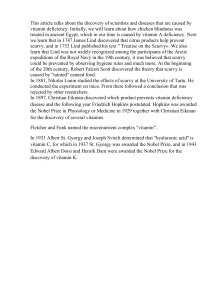


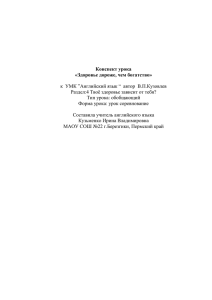
![ISSN 1561-6274. Нефрология. 2009. Том 13. №3. © Ì.Ì.Âîëêîâ, 2009 ÓÄÊ 616.61-036.12-008.9]:546.41+546.18](http://s1.studylib.ru/store/data/002088276_1-4bc2ed86dc4c87a6d852f5029de422b0-300x300.png)
